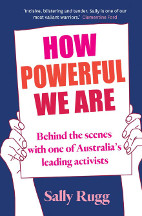How powerful we are by Sally Rugg

Hachette, Australia, 2019. ISBN: 9780733642227.
(Age: 14+) Highly recommended. Themes: Non-fiction, LGBTIQ+, Gay
marriage, Activism. No doubt history will see the Liberal Party
recorded as delivering equal marriage rights to the LGBTIQ+
community in 2017. Sally Rugg's book is an attempt to counter the
re-writing of history on how Australia achieved one of the most
significant changes in a generation. It did not just hinge on the
Yes vote of a postal survey, it was the result of decades of work by
a grassroots campaign that would not give up. It was the Liberal
government, under Howard, that specifically amended the Marriage Act
in 2004 to state that marriage was a union between one man and one
woman, and that any alternative union solemnised overseas would not
be recognised in Australia. Various attempts by state governments to
allow gay marriage were ruled unconstitutional. That ruling
clarified for activists that the only way forward was legislative
change to the federal law. Thus the campaign began.
Rugg's book recounts all the steps along the path to achieving
recognition of gay marriage, basically the recognition of rights to
not be discriminated against. Not only is it a step-by-step
historical view of the campaign, the book also provides insight into
the strategising process essential to activism. The equal rights
campaigners knew at the time of the postal vote that the majority of
Australians supported gay marriage, so the task was not to be drawn
into argument with people who were not likely to change their minds,
the strategy was to ensure that Yes voters actually went to the
effort of filling in and lodging a non-compulsory postal vote. That
meant not being drawn into futile arguments with nay campaigners
maligning the Safe Schools program, not being drawn into the fear
mongering, but just staying focussed on encouraging the majority
supporters to make their vote count. And ultimately that strategy
was successful.
Rugg's book is an incredibly valuable historical record for students
of civil rights history, as well as being a wonderful insight into
the collaboration and focussed strategy required to achieve change
at the community level - giving hope that people can unite together
to influence government policy. On top of that, it is Rugg's
personal story, a heart-warming story, with funny anecdotes, of
sometimes making mistakes along the way but managing to work
together with friends to achieve something they and all Australians
can be proud of.
Highly recommended for school libraries.
Helen Eddy